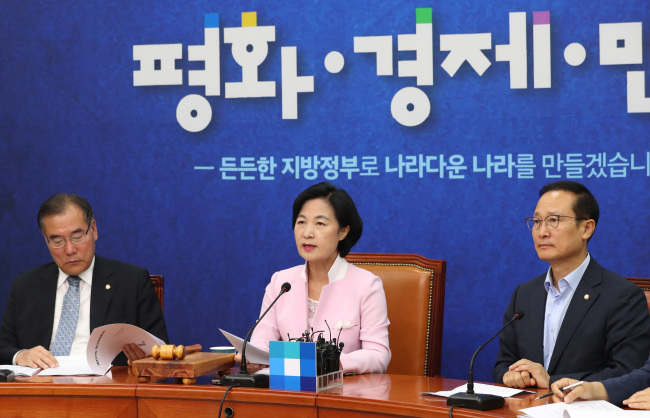Political parties show mixed reactions to investigative power reforms
By YonhapPublished : June 22, 2018 - 11:59
Rival parties on Friday showed mixed reactions to the government's decision to enhance the police's authority to investigate independently of the prosecution.
The government announced Thursday that it will empower police to initiate and close cases without approval from the prosecution as part of long-delayed reforms of the division of investigative powers.
The ruling Democratic Party stressed the need to swiftly start the parliamentary process to revise related laws to accelerate the government's drive to address the excessive concentration of investigative powers in the prosecution.
"The National Assembly should expedite the legalization of the proposal through active consultations among parties," Choo Mi-ae, the chief of the DP, said at a meeting with senior party members

But opposition parties took issue with what they described as a unilateral announcement by the government that was made without consulting parliament.
"The government unveiled the measures without prior explanation," said Rep. Kim Jin-tae of the main opposition Liberty Korea Party. "Everything should be re-examined from scratch."
Kim Dong-cheol, acting leader of the minor opposition Bareunmirae Party, said that the proposal lacks measures to limit a president's excessive authority to appoint officials.
The government delivered its proposal Thursday to a parliamentary special committee on judicial reform, hoping that the National Assembly could quickly review law revisions.
But it is uncertain when the process could kick off as parliament has been idle for about a month, mainly because opposition parties are preoccupied by internal conflicts in the wake of their crushing defeat in last week's local elections.
Parties have yet to fine-tune details about the formation of standing committees that will operate in the second half of the 20th parliament's four-year term, a key process to normalize the National Assembly. (Yonhap)








![[KH Explains] How should Korea adjust its trade defenses against Chinese EVs?](http://res.heraldm.com/phpwas/restmb_idxmake.php?idx=644&simg=/content/image/2024/04/15/20240415050562_0.jpg&u=20240415144419)











![[Today’s K-pop] Stray Kids to return soon: report](http://res.heraldm.com/phpwas/restmb_idxmake.php?idx=642&simg=/content/image/2024/04/16/20240416050713_0.jpg&u=)